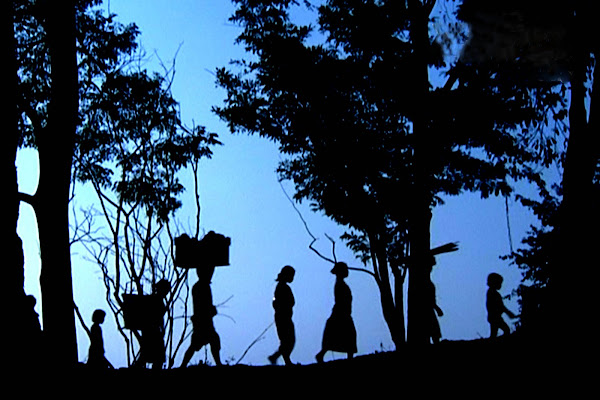SARASWATHY NAGARAJAN
‘Yarwng,’ a film from Tripura, will open the Indian Panorama of the IFFI that begins in Goa today. The film was canned by a 10-member technical crew from Kerala.
________________________________________
It is a reflection of the feeling of loss and hurt that has scarred the displaced tribals: FATHER JOSEPH PULINTHANATH
________________________________________
Realistic take: Scene from ‘Yarwng,’ the film in Kokborok, a tribal language of Tripura, captures the sense of alienation of the displaced people.
‘Yarwng’ (roots), the inaugural film of the Indian Panorama (International Film Festival of India 2008), attempts to go to the root of the angst of the uprooted tribals in Tripura.
Made in Kokborok, a tribal language of Tripura, the 95-minute film highlights the sense of alienation of the displaced and their heroism and endurance even when the ground beneath their feet is swept away by the winds of change. Directed and scripted by Father Joseph Pulinthanath, ‘Yarwng,’ a love story, is set against the construction of a dam that submerges fertile land inhabited by the tribals.
Travails of the displaced
“Thirty years ago, many inhabitants of Raima Valley were forced to move out when the valley was submerged due to the construction of an electricity-generating dam on the Gumti river. The granary of Tripura was transformed into ‘catchments of resentment.’
“My story is based on that incident. I have focussed on the travails of the displaced through the story of Karmati and Wakhirai, whose dream of marriage is drowned in the waters of the Raima and the Saima as their village gets submerged,” narrates Father Joseph.
Well-etched characters in the film throw light on how the loss of their land impact upon the cultural, social and economic structures that shape their lives.
Produced by Father Joseph Kizhakkechendu, a member of the Don Bosco Society, and filmed by a crew from Kerala and West Bengal, the film’s selection has come as a shot in the arm for activists of the Kokborok language.
“More than 19 languages are spoken by the tribals of Tripura. But Kokborok could be called the lingua franca of the people. ‘Yarwng,’ the third film made in the language, gives a fillip to the cultural identity of Tripura,” says Father Joseph.
Shot on actual locations around Gandacherra, in places such as Isoraipara, Bolongbasa, Hakumapara, Raima-Saima Water Reservoir and so on, the film’s characters are enacted by the tribals who relive the trauma in front of the camera. The only professional actor in the cast is Meena Debbarma who plays the female lead and also worked as the production coordinator.
Challenging job
Says Kerala-based Sajeev Pazhaoor, associate director of the film: “I had to trim the 140-scene script to 58 scenes before we could begin work on the film. We camped in Tripura for 32 days and canned the film under difficult circumstances. We were working under the shadow of the gun on account of the presence of the armed militants.
“The weather was another obstacle. It would be misty till about 11 a.m. and then the place would be flooded in harsh sunlight. All shooting had to be done quickly to maintain continuity as the light kept changing rapidly and by 4 p.m. darkness would descend on us. Moreover the actors, many of them tribals, are not used to a nine-to-five working day. Some of them had to be coaxed to come for the shoot every day.”
The 10-member technical crew from Kerala included cinematographer Kannan, camera associate Shaji Pattanam. Spot sound recording was done by Krishnakumar.
‘Yarwng’s selection to the Indian Panorama has pushed logistical and creative difficulties to the background.
“It is a boost for the community here as the film voices their plight. It is a reflection of the feeling of loss and hurt that has scarred the displaced tribals. We hope ‘Yarwng’ will make people think and discuss the issue of development and the problems of the displaced and their rehabilitation,” says Father Joseph.
He adds that his next film, when and if it materialises, will also be rooted in reality.
Online edition of India's National Newspaper
Friday, Nov 21, 2008
http://www.hindu.com/fr/2008/11/21/stories/2008112150720100.htm
Subscribe to:
Post Comments (Atom)

No comments:
Post a Comment